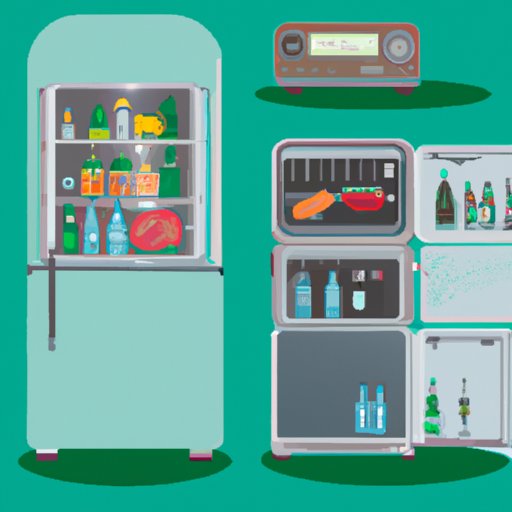Introduction
Refrigerators are an essential part of modern life. From keeping food fresh to providing cold drinks on a hot summer day, refrigerators have become a staple of our lives. But when were refrigerators invented? This article will explore the history and evolution of refrigerators, from their invention in the 1800s to the development of modern cooling technology.
History of Refrigerators: A Look at the Invention of the Refrigerator
The history of refrigeration dates back to ancient times, when people used ice and snow to preserve food. As early as 1748, scientist William Cullen demonstrated the principle of refrigeration by creating a vacuum over a container of diethyl ether and causing it to evaporate, thus lowering the temperature inside the container.
However, it wasn’t until the 19th century that the first practical refrigeration systems were developed. In 1834, American inventor Jacob Perkins created the first vapor-compression refrigeration system, which used a compressor to force vaporized liquid refrigerant through a condenser, then into an evaporator, and finally back to the compressor. This system was the basis for modern refrigerators and is still used today.
In 1876, engineer and inventor Carl von Linde patented the first commercial refrigerator, which he called the “Linde Apparatus.” This device used ammonia as a refrigerant and was primarily used in breweries and industrial applications. Over the next few decades, other inventors continued to refine the design of the refrigerator, making them more efficient and reliable.
By the 1920s, the electric refrigerator had become a common household appliance. The introduction of this new technology revolutionized the way we store and preserve food, allowing us to keep food items fresh for much longer than ever before. According to a study by the University of California Davis, “the invention of the refrigerator increased the availability of perishable foods, including milk, meat, fish, and eggs, and allowed households to store larger amounts of food.”

Exploring the Evolution of Refrigerators from Early Times to Present Day
Since their invention in the 19th century, refrigerators have come a long way. Modern refrigerators are much more energy efficient, offer more storage space, and feature a variety of useful features such as ice makers and water dispensers. However, the basic principles of refrigeration have remained largely unchanged since the days of Carl von Linde.
One major development in recent years has been the introduction of “smart” refrigerators. These devices use Wi-Fi connectivity and voice control to allow users to control their refrigerator remotely. Smart refrigerators can also alert users when food is about to expire, provide nutritional information, and even order groceries online.
Another key development has been the introduction of energy-efficient refrigerators. According to the U.S. Department of Energy, “The average refrigerator manufactured in 2019 used 322 kWh/year, compared to 1,077 kWh/year for a refrigerator manufactured in 2001.” This represents a significant reduction in energy consumption, helping to reduce environmental impact and save money on energy bills.

Refrigerator Inventions: The Road to Modern Cooling Technology
The invention and evolution of the refrigerator has been an ongoing process of trial and error. Over the years, a number of key innovations have helped to shape the modern refrigerator, including:
- The introduction of Freon refrigerants in 1930, which are still widely used today.
- The development of automatic defrosting systems in the 1950s, which eliminated the need to manually defrost a refrigerator.
- The introduction of self-contained refrigerators in the 1960s, which allowed for easier installation and maintenance.
- The development of sealed systems in the 1970s, which improved efficiency and reduced the risk of refrigerant leaks.
- The introduction of digital temperature controls in the 1980s, which allowed users to precisely control the temperature inside the refrigerator.
Today, modern refrigerators are equipped with a range of features that make them more convenient and efficient than ever before. Key components of the modern refrigerator include:
- Compressor – The compressor is responsible for compressing and circulating the refrigerant throughout the system.
- Condenser – The condenser is responsible for releasing heat from the refrigerant and cooling it down.
- Evaporator – The evaporator is responsible for absorbing heat from the air inside the refrigerator and cooling it down.
- Thermostat – The thermostat is responsible for regulating the temperature inside the refrigerator.
Conclusion
The invention of the refrigerator has had a profound impact on our lives. Refrigerators have allowed us to store and preserve food for much longer than ever before, making it possible to enjoy food that would otherwise spoil quickly. Over the years, advances in refrigerator technology have made refrigerators more efficient and capable than ever before.
From early experiments with ice and snow to the introduction of modern cooling technologies, the history of refrigerators is a fascinating one. Although there have been many inventions and innovations over the years, the basic principles of refrigeration remain largely unchanged. As we continue to explore the possibilities of cooling technology, the future of refrigerators looks bright.
(Note: Is this article not meeting your expectations? Do you have knowledge or insights to share? Unlock new opportunities and expand your reach by joining our authors team. Click Registration to join us and share your expertise with our readers.)
